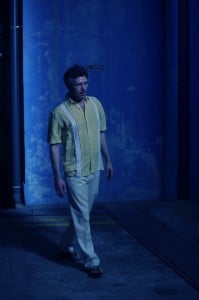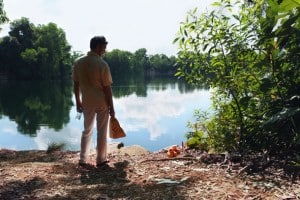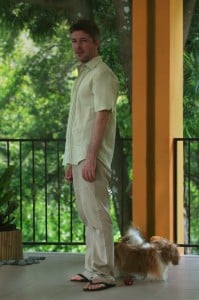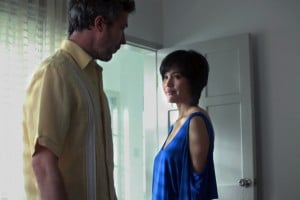
Directing duo Christine Molloy and Joe Lawlor came to prominence under the moniker of the ‘desperate optimists’, with their Civic Life series of short films, made between 2003-2010. In 2008 they struck out to feature film territory with their acclaimed debut Helen. Now, five years later, they return with their follow-up, Mister John, which tells the story of Gerry (Aidan Gillen), who travels to Singapore after the untimely death of his brother John, only to find himself slipping a little too comfortably into John’s old life…
Ahead of the release of the film, Alex Barrett sat down with Christine and Joe to talk to them about the ideas and methodology behind Mister John.
AB: I wanted to start by asking you about one of the key ideas behind Mister John, that of ‘trying on a life that isn’t yours’. It seems to me that this idea can be related back to Helen, and I was wondering how conscious you were of that? Do you see the two films as companion pieces, or is it more a case that this idea interests you, and just happens to be in both works?
JL: No, we don’t see them as companion pieces, but it may well be that they get forced to be such. So, it would be much more of a case that we are really interested in that idea as a premise. We were very conscious of that [idea] as we were embarking on the development ofMister John. It wasn’t that we were thinking about Helen, we are intuitively drawn to framing devices where somebody tries to get out of a wormhole in their life and enter into some other kind of world. I suppose the question of why that interests us…I have no idea why we’re drawn to that. I guess at its root it’s really an interest in, without sounding too literary, moments where the human condition is up against a wall and under great pressure. In that moment, one thing that may well happen is that you become somebody else, or lose a sense of who you are, or some opportunity might present itself. And that’s always a very interesting thing. It may be that it’s a desire, an interest in other films where people are hanging on to their sanity – which is ultimately the greatest sense of losing oneself. And I guess that may be to do with our own family history, where that’s been very much a reality. So if I was on your couch, I might say that it is a childhood thing, that it’s been there ever-present in our lives. But as a theatrical or cinematic device, we’re drawn to that for some reason. 
CM: And there might be another counter-point to that, which is probably much more banal. We left Ireland in our twenties, and that idea of being an outsider coming into a new environment and that chance to start again has always been something that intrigued us and informed the theatre work that we made when we were in college, and when we subsequently left college. We’re interested in places and worlds where people are afforded that opportunity. The seeds for the idea of Mister John came out of the experience of going to visit Joe’s brother, who had remade his life in Phuket in Thailand where he runs a bar, and being interested in the kind of people who are drawn to a place like Phuket – what kind of man in particular. A lot of them have really complicated stories, and they come to Phuket and it’s almost like they’ve been given a clean sheet of paper, and they can reinvent themselves. Whatever troubles and baggage they have, they’ve left them behind. And they kind of step into another world, because a lot of them have girlfriends, you know? And they pick up the threads of that relationship, and it’s not even a relationship and everybody knows that it isn’t. But they behave and act out as if it is. And I guess those kind of elements do really interest us. That’s the more banal side of it, and then maybe the more psychiatrist couch end…
JL: I was just thinking of one guy, actually, who’s now in jail. He was doing some sort of social welfare claim, he had nine pseudonyms going in Ireland, and he would spend half the year in Thailand. So he had nine identities in Ireland and I think Thailand was the only one where he was living this great life. Anyway, he was eventually caught. But I think that is true. It’s also true that when you go away to another place, I don’t know if it’s the case for everybody, but when you’re alone, I think Simone de Beauvoir has this comment, you become very alive, and when you’re travelling alone in particular. And maybe in those moments people begin to realise things about themselves – things they like and things that they don’t like. Which again, is to do with Mister John: this idea he’s travelled. But maybe in the travelling, in the very nature of travelling, alone and being alone, that sense of loathing about himself might be replaced by wanting to be something that he’s happier with. I think that’s very much present. 
AB: Something else I wanted to ask you is related to what we’ve just been talking about: I don’t know if you’d agree with this, but it seems to me that the idea of ‘trying on a life that isn’t yours’ can also be applied to the filmmaking process. Quite obviously with actors, but also with writers and directors, because when you write or direct you have to put yourself into the mind-set of the characters. So I was wondering if you saw any connection between the themes of your work, and the actual creation of your work? Do you and your characters have that in common? You spoke about potentially autobiographical elements, but is there something in you personally that…
JL: Well, I think it’s in all of us. In the lift on the way up here we were talking about our daughter and her cousin, and the various role playing games that they act out. You know, mad ones. And so they play out different kinds of characters, with different accents. As you get older that’s kind of knocked out of you in a way, people become less imaginative about who they are and who they might be. Kids can try out different fashions and different styles, then as you get older you come to be identified with one particular kind of way of being or way of looking, which is not necessarily your nature. You might have suppressed certain things. So consequently, yes it’s true, I do think by writing characters, you can really keep that alive. Actors, obviously, can keep that very much alive, but writers more, I think, than directors, actually. I think writing and acting can keep that sense of transference. If you really wanted to do that, and you wanted to play out certain kind of roles, I think writing and acting would be the way to do it. Directing is probably less a way of applying that. When you’re in the act of directing, in a sense, the moment to really act that out or inhabit someone else’s skin is in the moment of writing rather than the moment of directing, from our experience.
CM: Yeah, but directing is a more concentrated job. It’s an interesting thought. You might define yourself as a director, and we don’t necessarily. It’s one of the jobs we do. But it’s the one you do the least of. I mean, we shot Helen in 2007, and then we shot Mister John in 2012, and we made one short film in the intervening years. And so, to call yourself a director when you do it so rarely…I mean, Helen was shot in 14 days, Mister John was shot in 22 days. So you’re not doing much. You have to almost take on a role, and then imagine yourself into it, because it’s not something that you do very often. I remember when we were in college doing theatre degrees, one lecturer who did performance always encouraged us to fake it. If you’re not sure, just fake it. And I think it’s probably a very useful lesson to keep in the back of your mind, that you can fake it by stepping into a role. When we performed ourselves, one of the things that we did in our approach to performance was to almost have on/off buttons, so the idea of stepping into a role and building up a character was never really present. It was ways to switch things on and off, so if you needed a real heightened moment of performance, you just switch that button on and then switch it off. So it was something that you can step into and then step out of very quickly.
JL: To go back to the directing. I remember reading, I don’t know how true it is, that footballers, in an average game, actually have the ball at their feet for something like six seconds. That’s it. So they’re 90 minutes on the pitch, but literally with the ball, it’s only a few seconds. That’s all it ever is. And you’re just hanging around the rest of the time, man marking, getting into position, not getting the ball. But you’re always in the game, aren’t you? You’re always writing, you’re dreaming, you’re fantasising, you’re projecting, you’re fictionalising. It’s really about the mental process, ultimately. How you come to this set or the floor or the scene. Why you’re so clear is because you’ve actually written through this whole process. Now what it would be like if you weren’t the writer of that material, that would be a difficult job, I think. To just step into that. That’s something I wouldn’t do. I can’t imagine that, unless you went through a very intimate journey with the script.
AB: One of the things I really like about your work is that it feels like the product of a distinct vision. Your films, and I means this as a compliment, have a designed look to them. How do you work with the camera? Are you designing it all with pen and paper before the shoot? What’s your process?
JL: No, we don’t storyboard, although I think perhaps there’s a good argument for that in the future [laughs]. Helen was much more distinctive in a way, much more wilful. Each day we just did four shots. I think all the camera crew were just completely bewildered. But it was mad, actually, for them, and Ole [Birkeland, cinematographer on Helen and Mister John] was brilliant because he had never worked like this before either. We pretty much knew how we wanted every shot to go, to function. Mainly, for us, it’s really choosing the right location and hanging out in the location. And imagining the scene in that actual space. We try not to imagine a location. We like to find the locations. Sometimes, in the case of Helen, the writing came after the location. We found a lot of locations, and wrote a story about the locations. And I think the reasons we choose forests a lot is we just love forests, and they’re usually very easy to photograph, and they photography very well with 35mm. So we think about the shots very much as the experience for the audience, and what the scene requires. But we don’t storyboard. I think the locations are really really central to the overall experience.
 CM: It’s trying to create a believable world to preserve the ideas in the film, I think. It’s really central to the way we approach making films. So I guess we’re thinking less about the machinations of plot and narrative, and more about trying to create a world. So obviously the role of the camera and how it’s filmed and framed, and how things operate within the frame, are really central. But yeah, we don’t [storyboard]. We did do this really silly thing in Singapore which drove me mad in the end, where we tried…it was almost like a halfway house to storyboarding, but to me it was a really difficult exercise, because it’s a lot easier to work things out when you’re actually in the location – although there is certain things, certain problems you can pre-empt and work yourself out of, I think, if you’ve maybe used pen and paper a little in advance. But mostly we like to work on location.
CM: It’s trying to create a believable world to preserve the ideas in the film, I think. It’s really central to the way we approach making films. So I guess we’re thinking less about the machinations of plot and narrative, and more about trying to create a world. So obviously the role of the camera and how it’s filmed and framed, and how things operate within the frame, are really central. But yeah, we don’t [storyboard]. We did do this really silly thing in Singapore which drove me mad in the end, where we tried…it was almost like a halfway house to storyboarding, but to me it was a really difficult exercise, because it’s a lot easier to work things out when you’re actually in the location – although there is certain things, certain problems you can pre-empt and work yourself out of, I think, if you’ve maybe used pen and paper a little in advance. But mostly we like to work on location.
JL: If you’re working with design, and somebody had to come up with these designs and not something that we can literally find in a room, or if you’re looking for the right kind of hotel…This was a bit of a problem for us in Singapore. We looked at eighteen or nineteen hotels, minimum, and we never really…The one we got in the end was okay, but we did see one that was better than that, but they didn’t want anyone [to film there]. It was a bit of a dodgy hotel. In those moments, when you can’t find the right kind of hotel, then I suppose you do need something purpose built, and then it’s more difficult to imagine what the shot is, because you can’t actually be in the right location until that design is made. But I think the locations tend to inform the kind of shot that should take place in there, and the kind of words also. Now that we’re in this bedroom, and now that we can see the light the way it is, and we don’t like to use that many lights, it seems to be that this mood would require…you know, we’d say to Aidan, ‘we’ve spent the last few years writing the script, and these are the words for the scene, maybe we don’t need them now, or maybe we only need half of them’. It was the scaffolding to get you to that particular point, because now you’re in this room with these actors, you really need to be alert to what’s required now. You have to be careful about not deviating too much from the script, which we didn’t at all, but you can’t be so compelled by everything that you’ve written, and what the actors say doesn’t have to necessarily happen exactly verbatim right here, right now. But you have to be a bit open to that possibility as well.
AB: I thought the score was really powerful in Mister John. Could you talk about the use of music in the film, and how you worked with your composer, Stephen McKeon?
JL: It’s a big thing for us. I thought the score for Helen was very strong. But you’re taking a risk, you know? You work very closely with the composer, because it’s the one thing which could really make an emotional mess of things. We had to work with Irish composers because of taxation reasons, and that’s fine – there are lots of great Irish composers. We had this shortlist, and we met a few of them. This particular guy, Stephen, talked about the film in the right way and had one or two things in his catalogue which were sort of heading in the right direction. We just wanted a sense of theatricality about it. We use this word far too liberally, I think, at times, but we do like a sense of theatrically, that it feels real, but ultimately we don’t believe that’s it real real. It’s theatrically real. And we like that. I mean, we like the work of, I don’t know, Miklós Jancsó, for example – it’s got a theatricality to it, which we find quite powerful. And we’re not looking for it to be socially realistic, in that sense, but realistic and effective on other levels. And so we wanted the music, when it happened, to not be one of those plinky-plonky things. We wanted it to be more Hitchockian. Big. It won’t happen that often, but when it would come in, it would be quite strident and it would announce itself quite clearly and it was telling you: this is the music and we’re not trying to seduce you unbeknownst, we’re not trying to manipulate you. It’s very upfront and honest in that level. But we wanted something pretty scored, something quite large and classical. We had a lot of temp tracks from Greig, actually. We listened to a lot of Greig throughout the editing process, and there was a great piece of music that we could never afford. In the end I was glad, and Stephen was thrilled because he wanted just his music in the film, but it was by Carl Orff and it was part of his Schulwerk series, and it was a beautiful little folk ballad, amazing. But it didn’t quite work.
CM: Yeah, it would have been all wrong.
JL: It was like twenty-five grand, or something like that, just for that song. You’re just thinking, get out of here.
CM: But we also wanted to work with somebody who we could have a conversation with, and really collaborate with. It was a really great part of the working process, our dialogue with Stephen. [We wanted] somebody who was up for that, and Stephen was really really up for a dialogue. We got into a lot of detail about how the score was working. Stephen really wanted to see that there was money in the budget to have the music performed live, that we could bring that feel and interpretation to the music. We ended up having the music performed, which I think really worked and was incredibly effective. On some level I think the music kind of charts aspects of Gerry’s journey into his brother’s world, and yes it’s a rupturing, or a real kind of counterpoint to the environment that he’s in, because it’s classical. So it’s kind of at odds.
JL: Yeah, it’s not Asian music. We wanted something Northern European, very much of the European sensibility, and not of the South East Asian one. We’re not musicians, but we do approach things in something of a musical sensibility. So we can talk music to him, about certain phrases and quotes, and ‘could that just go into this, segue into this bit rather than this bit’. So we can get into that level of detail. But I think it was really important that if the composer was just one of those people that said, well look, I will compose something and that will be it, I don’t know if we would…then it would be like ‘well, what if we didn’t like it?’. And so the idea is to have a dialogue, so you would head that off at the pass, so of course you’re going to like it, because any good composer would be listening to the music that we’ve been listening to and would pick up on that. We were fortunate that he’s really great with his job, but he did respond very well and we were very pleased with that music. Alex Barrett.
MISTER JOHN IS ON GENERAL RELEASE FROM FRIDAY, 27TH SEPTEMBER 2013 AT CURZON RENOIR